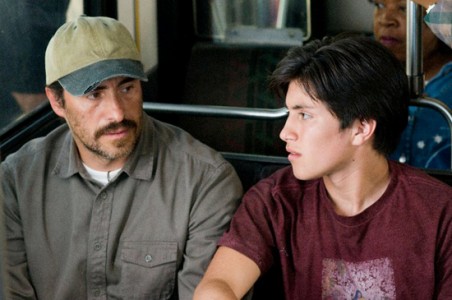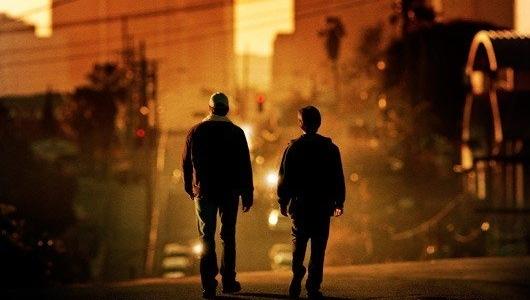A Better Life is Bicycle Thieves remodelled for modern LA. Vittorio De Sica’s iconic 1948 film about an Italian father and son living over a precipice of poverty sadly requires adjustment only in its details, the theft of a bicycle the father needs to seek work here updated to a stolen truck. Director Chris Weitz has parlayed the success of his vampire franchise hit Twilight: New Moon into this virtual remake set in Latino LA, the often illegally present half of the city’s population its wealth depends on. Their status in Hollywood is shown by the endless movies dismissing them as Manuel-style, funny-talking, shiftless servants. Weitz’s dive into this hidden world acts as partial redress.
The journey of Carlos (Mexican star Demián Bechir) from his shabby flat to work illegally on the city’s far side as a gardener in green Malibu mansions, then back to exhausted early-morning sleep as Luis (16-year-old José Julian, in his debut) grudgingly leaves for school, sketches how things are. Carlos’s wife left long ago for a wealthier partner, and the baffled, halting affection between single parent and son across both a generation and cultural gap (raised in LA, Luis barely speaks Spanish) is movingly convincing. Luis’s adolescent tough front hides vulnerability and kindness. Carlos’s shy stoicism is a simpler adult foil than amoral chancer Hugh Grant’s in About a Boy (2002), but those attracted by the poster’s reminder of Weitz’s writing and directing of that film with his brother Paul won’t be wholly disappointed.
Carlos’s gruellingly incremental attempt at self-betterment on his son’s behalf is rivalled by the violent gang culture which surrounds home and school. These aren’t inherently evil “gang-bangers”, but friends and family Luis visits after classes for dates and homework, whose exitless culture, with its attractively instant violent solutions and money, may still swallow him. It’s to prevent this that Carlos borrows his sister’s savings to buy a truck, so he can run his own gardening business.
He’s working high up a tree when a runty fellow immigrant he’s kindly given a job to makes off far below with his carelessly tossed keys and truck - a vertiginous moment of almost instant betrayal, poverty’s pressures here the enemy of honour and community. The helplessness of Carlos’s extra-legal existence is shown when he swerves away from the cop his rich employer could call on for help. Instead Luis, initially appalled by his dad’s despairing state when he stumbles home drunk that night, joins his quest for the truck.
 “Why do all these poor people have kids?” Luis rails as they explore LA’s sprawl, leaving his dad speechless. “What’s the point?” (Demián Bechir and José Julien, pictured right.) But as they wander through Mexican rodeos, Latino protests for immigrant rights and cramped South Central flats where those immigrants are piled high, recognition of his own roots dawns. Carlos’s saintly ability to rise above revenge when they reach their quarry is a load Bechir’s performance just about lifts. Dad’s integrity and toil anyway count for little in the illegal twilight zone he has to inhabit, where American justice and mercy stay out of reach, and in the law’s eyes he’ll always be a peon.
“Why do all these poor people have kids?” Luis rails as they explore LA’s sprawl, leaving his dad speechless. “What’s the point?” (Demián Bechir and José Julien, pictured right.) But as they wander through Mexican rodeos, Latino protests for immigrant rights and cramped South Central flats where those immigrants are piled high, recognition of his own roots dawns. Carlos’s saintly ability to rise above revenge when they reach their quarry is a load Bechir’s performance just about lifts. Dad’s integrity and toil anyway count for little in the illegal twilight zone he has to inhabit, where American justice and mercy stay out of reach, and in the law’s eyes he’ll always be a peon.
Weitz, who with his brother is from a wealthy Hollywood dynasty founded when his Mexican grandmother became a silent movie star, should be the perfect person to shepherd a part-Spanish language studio film about working-class LA Latinos. His decision to shoot in a plain, mainstream style, with moments of over-written tearjerking, and a hero who still believes in the American Dream even after he’s been shown its unreasonable, unfeeling cost, weakens A Better Life’s credibility and force. Illogical sugar-coating is, though, just what the blockbuster audience Weitz wants to hear this tale are used to. Making Mexicans and Mexican-Americans the core of this compromised landscape is a Pyrrhic victory.
Watch the trailer to A Better Life















Add comment